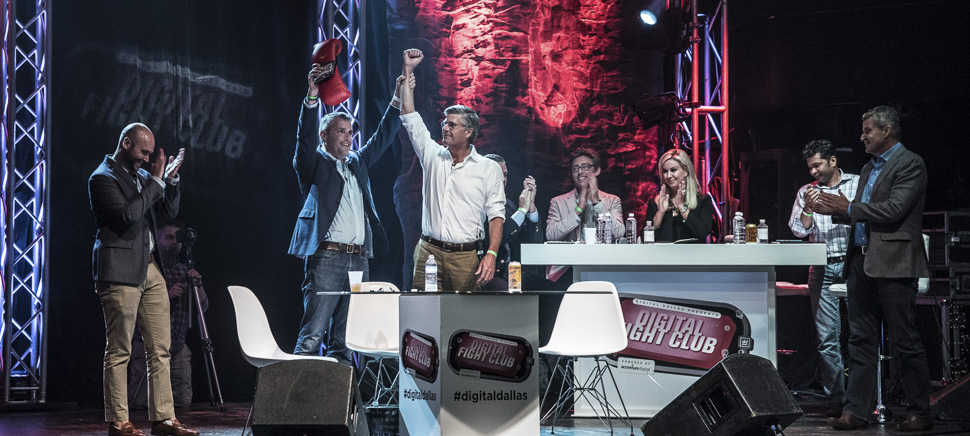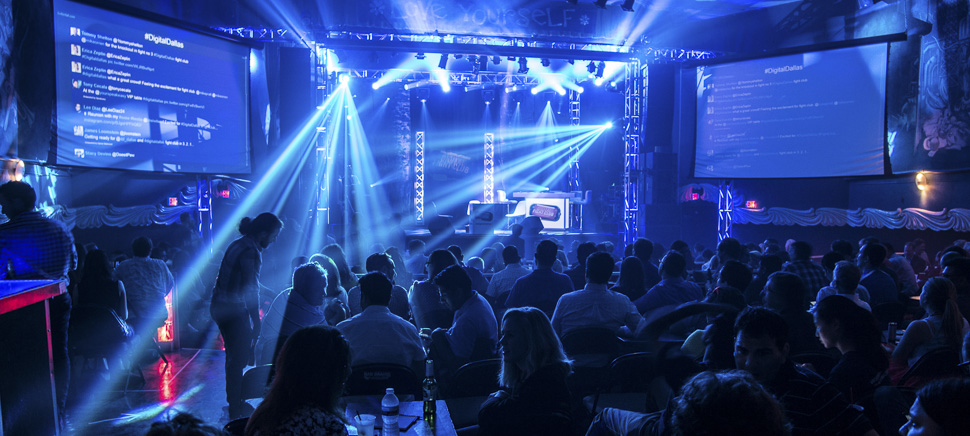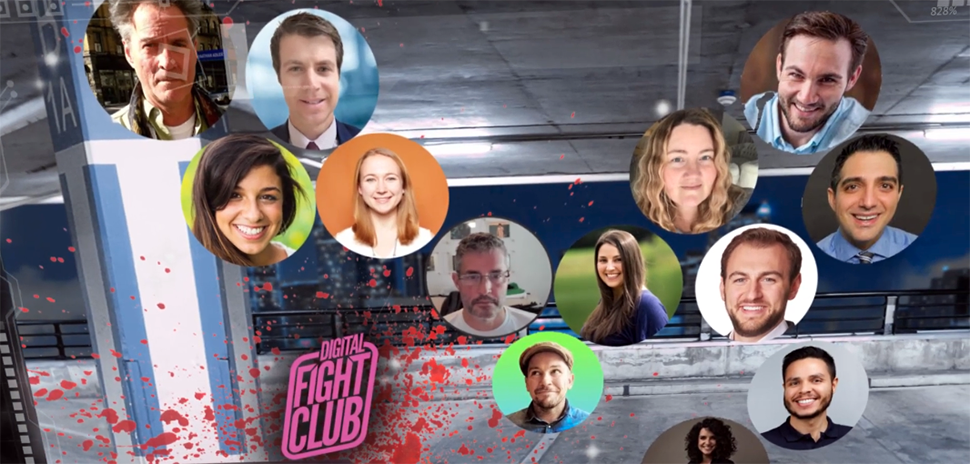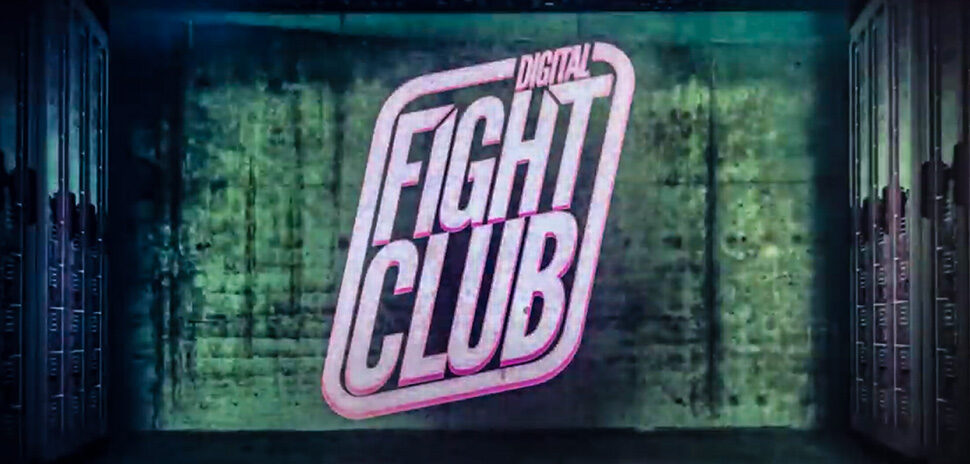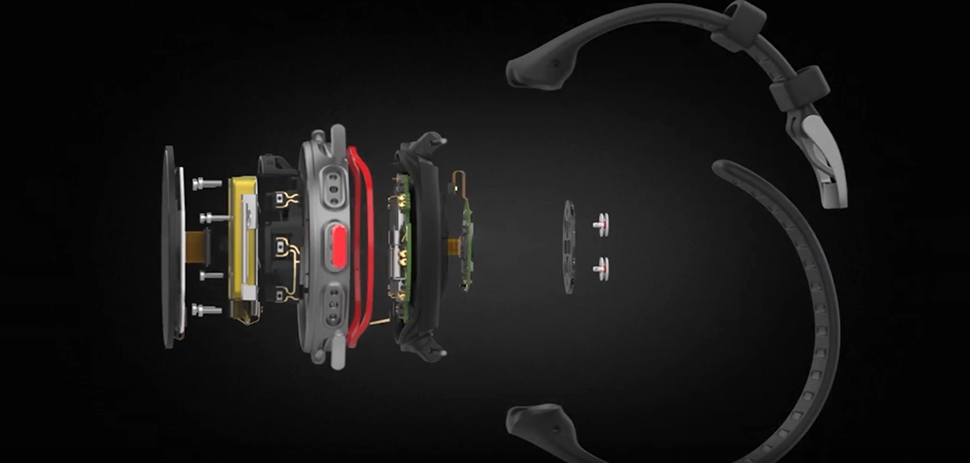The house was full for Digital Fight Club, where five sets of digital pugilists took each other on in five bouts at The Granada Theater to debate some of the hottest topics in technology.
 Each fighter had one minute to present their salvo, followed by a 30-second rebuttal, and a question from the referees. When the time was up, the refs, along with the audience, used a web app to place their votes and come up with a winner.
Each fighter had one minute to present their salvo, followed by a 30-second rebuttal, and a question from the referees. When the time was up, the refs, along with the audience, used a web app to place their votes and come up with a winner.
![[Photo: Bret Redman]](https://s24806.pcdn.co/wp-content/uploads/2016/08/DigitalFightClub_970_BretRedmanFULL-SHOOT-WEB-SIZE-2000-LONG-EDGE-DIGITAL-FIGHT-CLUB-082416-BRET-REDMAN-097.jpg)
Digital Fight Club referees. [Photo: Bret Redman]
Referees were Accenture Managing Director Andrew Hopkins, who led the panel, which included AT&T Senior Vice President of Software Development and Engineering, Sorabh Saxena; TXU CMO, Sydney Seiger; Distribion CEO, Tim Storer, and projekt202 Vice President of Customer Experience, Jeremy Johnson. Michael Pratt of Digital Dallas was the moderator.
Ten Fighters, Five Rounds
Fight 1
Virtual Reality: Dale Carman of Groove Jones versus Nick DiCarlo of Samsung
![[Photo: Bret Redman]](https://s24806.pcdn.co/wp-content/uploads/2016/08/DigitalFightClub_970_BretRedman_30-1.jpg)
[Photo: Bret Redman]
After they joined Pratt on stage, Carman warmed up with some squats and DiCarlo threw down some push-ups.
“Is virtual reality all about mobile or is about gaming and desktop? What ‘s the future of it?” Pratt asked. “Is there a business end or is it just a fad?
The first salvo went to DiCarlo.
“Remember 2002 … the start of the internet, the desktop browser … Netscape … ancient technology, DiCarlo said. “Fast-forward all this time, 1G, 2G, 3G, 4G now tons of Gs … Point is, PC has been left in the dust by mobile.”
1G, 2G, 3G, 4G now tons of Gs … Point is, PC has been left in the dust by mobile.”
Nick DiCarlo
“Mobile VR has been around for two years and PC just launched in April,” he said. “It’s just slow.”
“Virtual reality is magic. The power of virtual reality is presence,” Carman said. “Presence happens when I can move around when I can look at this object and get close to it. The only way to do that is on the PC.”
“The only way to get 90 frames per second, high poly count geometry is on the PC,” Carman continued. “The best experience today is on the personal computer.
“Did he tell you about that giant cable sticking off the back of your head? … What about $99?” DiCarlo rebutted.
“When I want to interact with my world and not just look at it, and rotate around on my head, then I have to be on my PC. And eventually I’ll be able to cut the chord,” Carman said during his rebuttal.
Winner: DiCarlo
Fight 2
IoT: Nathan Huntoon of PepsiCo, Frito-Lay versus Scott Harper of Dialexa
![[Photo: Bret Redman]](https://s24806.pcdn.co/wp-content/uploads/2016/08/DigitalFightClub_970_BretRedman_34-1.jpg)
[Photo: Bret Redman]
Pratt introduced the next fight topic: security, consumer benefits, and innovation versus regulation. Where do we draw the line?
Huntoon began the fight.
We’re in an information economy. It’s about gathering consumer information: Are you home? Are you driving? These pieces of information have a real value, Huntoon said.
“The internet of things is one widely publicized tragedy away, such as a device in a car that can be hacked and causes an accident.”
“Our position has to be in order for this burgeoning industry to have potential: We must put security and individual consumer privacy at a highly elevated position much more so than it is today,”
“The only thing that is lacking here today is standards that are adopted by industry and non-competing programs.”
Scott Harper
“This is an easy one to argue,” Harper said. “The valuable is undeniable.”
We have cell phones connecting to networks, cars, and homes. We’re battling whether security challenges are going to diminish the value. The benefits are plentiful, he continued.
Like any new space, there are challenges, Harper added.
“The only thing that is lacking here today is standards that are adopted by industry and non-competing programs.”
“It comes back to value chain,” Huntoon rebutted.
“This is conspiracy theorists speak,” Harper said. “It’s just not that complex.”
Consumers have a choice to support the companies they trust, Harper said.
Winner: Harper
Fight 3
Digital Content: Michael Sitarzewski of LaunchDFW versus Mike Orren of Speakeasy
![[Photo: Bret Redman]](https://s24806.pcdn.co/wp-content/uploads/2016/08/DigitalFightClub_970_BretRedmanFULL-SHOOT-WEB-SIZE-2000-LONG-EDGE-DIGITAL-FIGHT-CLUB-082416-BRET-REDMAN-105-1.jpg)
[Photo: Bret Redman]
“Content distilling advertising,” “ads are still alive—and they still work,” and “content distilling content” were among the hotbed issues Pratt threw out to the fighters.
“We ended up on this topic of content marketing,” he said.
Sitarzewski starts out with talking about how people become entrenched in a story and later find out it’s sponsored content.
“You want to be able to trust that author to tell you the truth and tell you the facts.”
Michael Sitarweski
“How do you know the content you’re reading is accurate and factual,” he said. “You want to be able to trust that author to tell you the truth and tell you the facts.”
That sponsored advertising leads to credibility issues. You want to be able to trust that author to tell you the truth and tell you the facts, Sitarzewski said.
Orren argued that content marketing is the oldest form of advertising.
“What we do now is produce advertising that is of use and value to the reader,” Orren said.
Winner: Orren
Fight 4
Big Data: Good or Evil?: John Keehler of SMU versus Dina Light-McNeely of The Marketing Arm
![[Photo: Bret Redman]](https://s24806.pcdn.co/wp-content/uploads/2016/08/DigitalFightClub_970_BretRedmanFULL-SHOOT-WEB-SIZE-2000-LONG-EDGE-DIGITAL-FIGHT-CLUB-082416-BRET-REDMAN-106-1.jpg)
[Photo: Bret Redman]
“Big Data is so hard to define, it defies comprehension,” Keehler said.
The potential we have with big data makes it worth any risk we might consider, he said. We will be able to reframe our work, reclaim our leisure time, we reclaim our lives, and none of that would be possible without the passive and active sharing of our big data.
Big Data has great risk but not a pristine resource, Light-McNeely said.
“Big Data could be used to navigate your way home, but guess what, they can also find you anywhere.”
Dina Light-McNeely
What if it was used to track your political preference? What if you live in a country where that put you at risk?
It could lead to invasion of privacy, and it “Can lead to exclusion and reinforce stereotypes,” she said. “Big Data could be used to navigate your way home, but guess what, they can also find you anywhere.”
“Big Data could be used to navigate your way home, but guess what, they can also find you anywhere.”
It can cost people their livelihoods and even their lives, Light-McNeely argued. Machine learning is possibly more dangerous than nuclear power. Biases will be brought to the creation of artificial intelligence.
Big data needs appropriate controls and protections, the kind of problems we can solve by using big data, Keehler rebutted.
Winner: Light-McNeely
Fight 5
Augmented Reality and Artificial Intelligence: Joel Fontenot of Trailblazer Capital versus Brad Rossacci of 900 lbs of Creative
![[Photo: Bret Redman]](https://s24806.pcdn.co/wp-content/uploads/2016/08/DigitalFightClub_970_BretRedmanFULL-SHOOT-WEB-SIZE-2000-LONG-EDGE-DIGITAL-FIGHT-CLUB-082416-BRET-REDMAN-119-1.jpg)
[Photo: Bret Redman]
One more round, and then we drink, Pratt said before the fifth fight started.
We are already living in an AI/AR world, Fontenot said.
Rossacci argued it’s not effective enough.
Winner: Fontenot
READ NEXT
GALLERY: For those with FOMO — or who just want to relive the glories of Digital Fight Night — we’ve got all the shots. Head here, and enjoy.
For a daily dose of what’s new and next in Dallas-Fort Worth innovation, subscribe to our Dallas Innovates e-newsletter.

